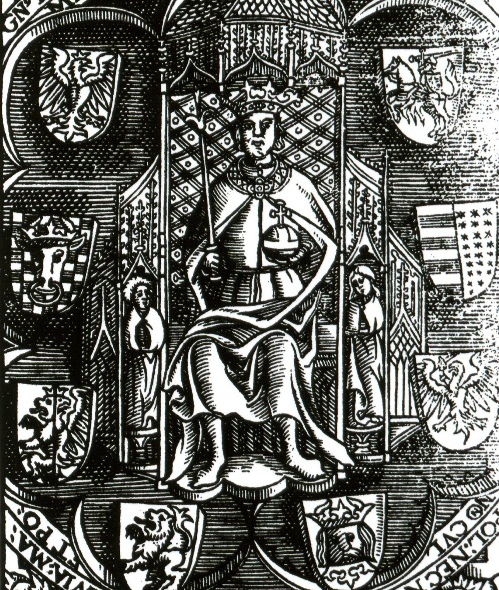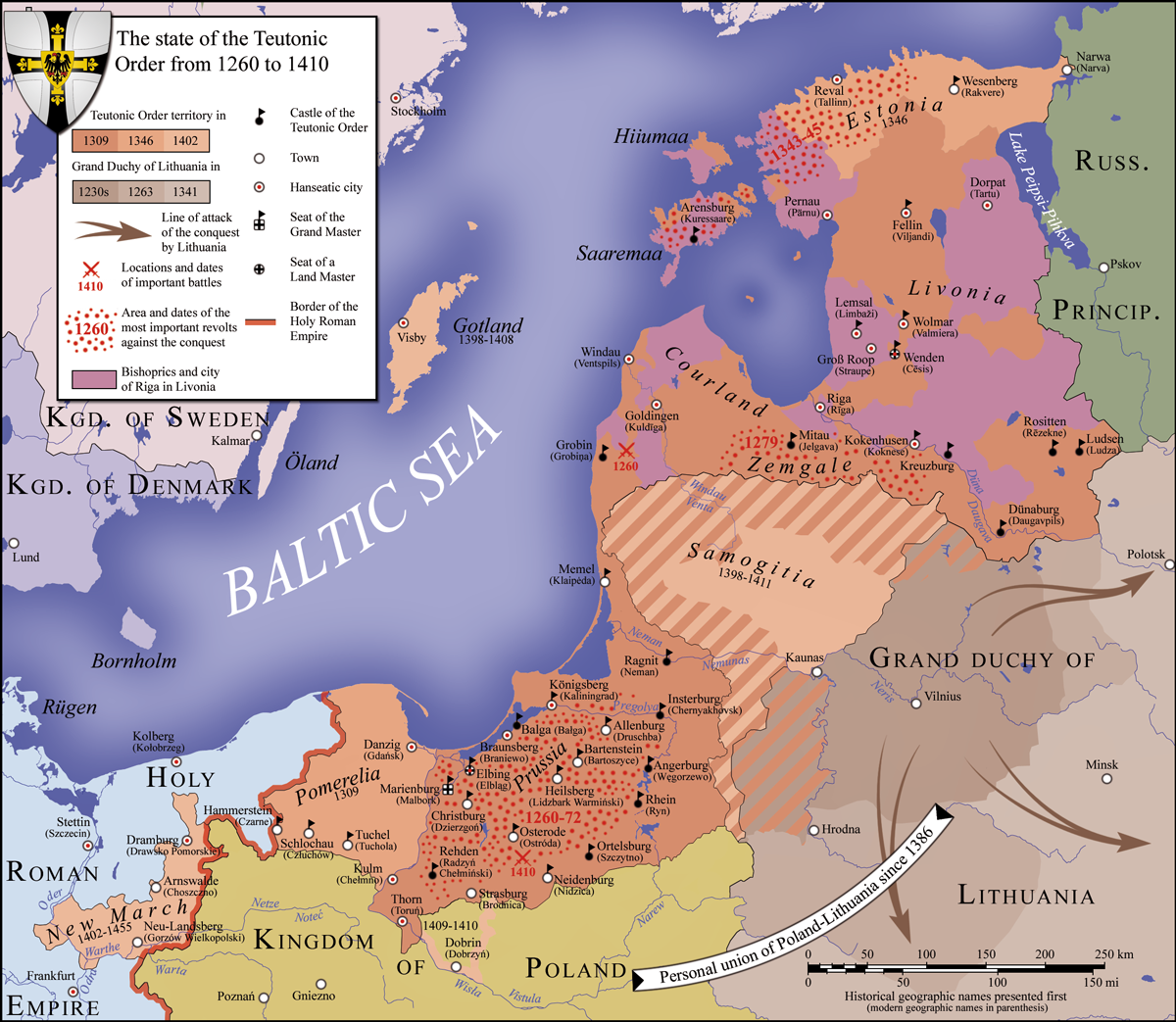|
Elbląg Voivodeship (1454–1466)
The Elbląg Voivodeship, also known as the Lower Prussian Voivodeship, was a voivodeship of the Crown of the Kingdom of Poland, with capital in the city of Elbląg, that existed during the Thirteen Years' War. It was established by king Casimir IV Jagiellon in April 1454, following the incorporation of the city and the surrounding area into Poland, from the territory of the State of the Teutonic Order. Following the signing of the Second Peace of Thorn, on 19 October 1466, the area of the voivodeship was officially ceded to Poland, after which, it was replaced by the Malbork Voivodeship. History Prior to 1454, the city of Elbląg, and the surrounding area belonged to the State of the Teutonic Order. In 1454, the state fought in the Thirteen Years' War, against the Crown of the Kingdom of Poland and the Prussian Confederation. On 12 February 1454, the inhabitants of Elbląg revolted against the Teutonic forces, and allied themselves with the Prussian Confederation. As such, the ... [...More Info...] [...Related Items...] OR: [Wikipedia] [Google] [Baidu] |
Voivodeship
A voivodeship ( ) or voivodate is the area administered by a voivode (governor) in several countries of central and eastern Europe. Voivodeships have existed since medieval times and the area of extent of voivodeship resembles that of a duchy in western medieval states, much as the title of voivode was equivalent to that of a duke. Other roughly equivalent titles and areas in medieval Eastern Europe included ban (bojan, vojin or bayan) and banate. In a modern context, the word normally refers to one of the provinces () of Poland. , Poland has 16 voivodeships. Terminology A voi(e)vod(e) (literally, "leader of warriors" or "war leader", equivalent to the Latin "''Dux Exercituum''") was originally a military commander who stood, in a state's structure, next to the ruler. Later the word came to denote an administrative official. Words for "voivodeship" in various languages include the ; the ; the ; the Bulgarian: ''voivoda'' (войвода); the Serbian: ''vojvodina'' (в� ... [...More Info...] [...Related Items...] OR: [Wikipedia] [Google] [Baidu] |
Voivode
Voivode ( ), also spelled voivod, voievod or voevod and also known as vaivode ( ), voivoda, vojvoda, vaivada or wojewoda, is a title denoting a military leader or warlord in Central, Southeastern and Eastern Europe in use since the Early Middle Ages. It primarily referred to the medieval rulers of the Romanian-inhabited states and of governors and military commanders of Poles, Hungarian, Lithuanian, Balkan, Russian people and other Slavic-speaking populations. In the Polish-Lithuanian Commonwealth, ''voivode'' was interchangeably used with '' palatine''. In the Tsardom of Russia, a voivode was a military governor. Among the Danube principalities, ''voivode'' was considered a princely title. Etymology The term ''voivode'' comes from two roots. , means "war, fight," while , means "leading", thus in Old Slavic together meaning "war leader" or "warlord". The Latin translation is for the principal commander of a military force, serving as a deputy for the monarch. In ... [...More Info...] [...Related Items...] OR: [Wikipedia] [Google] [Baidu] |
Prussian Confederation
The Prussian Confederation (, ) was an organization formed on 21 February 1440 at Marienwerder (present-day Kwidzyn) by a group of 53 nobles and clergy and 19 cities in Prussia, to oppose the arbitrariness of the Teutonic Knights. It was based on an earlier similar organization, the Lizard Union established in 1397 by the nobles of Chełmno Land. In 1454, the leader of the Confederation, Johannes von Baysen (Jan Bażyński), formally asked King Casimir IV Jagiellon, to incorporate Prussia into the Kingdom of Poland. This marked the beginning of the Thirteen Years' War between the Order's State and Poland, with the cities co-financing the military costs of the latter. Background According to the 1411 First Peace of Thorn which followed the Teutonic Knights' defeat in the Battle of Grunwald, the Teutonic Order had to pay high reparations to the Kingdom of Poland. The monastic state imposed high taxes on the cities to raise the funds as well as to re-arm for another war again ... [...More Info...] [...Related Items...] OR: [Wikipedia] [Google] [Baidu] |
Malbork Voivodeship
The Malbork Voivodeship (), after Partitions of Poland also referred to as the Malbork Land (Polish: ''Ziemia malborska''), was a unit of administrative division and local government in the Kingdom of Poland from 1454/1466 until the Partitions of Poland in 1772–1795. Its capital was at Malbork. Together with the Pomeranian and Chełmno Voivodeships and the Prince-Bishopric of Warmia it formed the historical province of Royal Prussia, and with several more voivodeships it formed part of the Greater Poland Province. History After the Teutonic Knights during the 13th century had conquered the Prussian territories and incorporated them into the Order's State, the castle of Marienburg served as the seat of the Grand Masters. Following the 1410 Battle of Grunwald, the Knights once again could withstand the Polish Siege of Marienburg. In 1440, various cities, towns and nobles from the area co-formed the anti-Teutonic Prussian Confederation. In 1454, the organisation led ... [...More Info...] [...Related Items...] OR: [Wikipedia] [Google] [Baidu] |
State Of The Teutonic Order
The State of the Teutonic Order () was a theocratic state located along the southeastern shore of the Baltic Sea in northern Europe. It was formed by the knights of the Teutonic Order during the early 13th century Northern Crusades in the region of Prussia. In 1237, the Livonian Brothers of the Sword merged with the Teutonic Order of Prussia and became known as its branch – the Livonian Order (while their state, ''Terra Mariana'', covering present-day Estonia, Latvia, and a small part of Russia, became part of the State of the Teutonic Order). At its greatest territorial extent during the early 15th century, the State encompassed Chełmno Land, Courland, Gotland, Livonia, Estonia, Neumark, Pomerelia ( Gdańsk Pomerania), Prussia and Samogitia. Following the battles of Grunwald in 1410 and Wilkomierz in 1435, the State fell into decline. After losing extensive territories in the imposed Peace of Thorn in 1466, the extant territory of its Prussian branch became known as M ... [...More Info...] [...Related Items...] OR: [Wikipedia] [Google] [Baidu] |
Casimir IV Jagiellon
Casimir IV (Casimir Andrew Jagiellon; ; Lithuanian: ; 30 November 1427 – 7 June 1492) was Grand Duke of Lithuania from 1440 and King of Poland from 1447 until his death in 1492. He was one of the most active Polish-Lithuanian rulers; under him, Poland defeated the Teutonic Knights in the Thirteen Years' War and recovered Pomerania. The Jagiellonian dynasty became one of the leading royal houses in Europe. The great triumph of his reign was bringing Prussia under Polish rule. The rule of Casimir corresponded to the age of "new monarchies" in western Europe. By the 15th century, Poland had narrowed the distance separating it from Western Europe and became a significant power in international relations. The demand for raw materials and semi-finished goods stimulated trade, producing a positive balance, and contributed to the growth of crafts and mining in the entire country. He was a recipient of the English Order of the Garter (KG), the highest order of chivalry and the most ... [...More Info...] [...Related Items...] OR: [Wikipedia] [Google] [Baidu] |
Thirteen Years' War (1454–1466)
The Thirteen Years' War (; ), also called the War of the Cities, was a conflict fought in 1454–1466 between the Crown of the Kingdom of Poland and the Teutonic Order. After the Battle of Grunwald, enormous defeat suffered by the German Order at the hand of Poland-Lithuania in 1410 and the ensuing political, military and economic problems, the state was rife with internal conflict between the ruling Order and the Old Prussians, native Prussian warlords, who shared concerns with assimilated Prussian and German townsfolk. Eventually this tension led to an uprising by the Prussian Confederation representing the local Prussian nobility and cities, who sought the protection of the Polish King Casimir IV Jagiellon. This essentially amounted to a switching of sides which the German Order immediately took as a mortal threat, and a war broke out between Poland and the Teutons. The Thirteen Years' War ended in the victory of Poland and in the Second Peace of Thorn (1466), Second Peace ... [...More Info...] [...Related Items...] OR: [Wikipedia] [Google] [Baidu] |
German Language
German (, ) is a West Germanic language in the Indo-European language family, mainly spoken in Western Europe, Western and Central Europe. It is the majority and Official language, official (or co-official) language in Germany, Austria, Switzerland, and Liechtenstein. It is also an official language of Luxembourg, German-speaking Community of Belgium, Belgium and the Italian autonomous province of South Tyrol, as well as a recognized national language in Namibia. There are also notable German-speaking communities in other parts of Europe, including: Poland (Upper Silesia), the Czech Republic (North Bohemia), Denmark (South Jutland County, North Schleswig), Slovakia (Krahule), Germans of Romania, Romania, Hungary (Sopron), and France (European Collectivity of Alsace, Alsace). Overseas, sizeable communities of German-speakers are found in the Americas. German is one of the global language system, major languages of the world, with nearly 80 million native speakers and over 130 mi ... [...More Info...] [...Related Items...] OR: [Wikipedia] [Google] [Baidu] |
Crown Of The Kingdom Of Poland
The Crown of the Kingdom of Poland (; ) was a political and legal concept formed in the 14th century in the Kingdom of Poland, assuming unity, indivisibility and continuity of the state. Under this idea, the state was no longer seen as the Patrimonialism, patrimonial property of the monarch or dynasty, but became a common good of the political community of the kingdom. This notion allowed the state to maintain stability even during periods of interregnum and paved the way for a unique political system in Poland, characterized by a noble-based parliament and the Free election (Poland), free election of the monarch. Additionally, the concept of the Crown extended beyond existing borders, asserting that previously lost territories still rightfully belonged to it. The term ''Crown of the Kingdom of Poland'' also referred to all the lands under the rule of the Polish king. This meaning became especially significant after the Union of Lublin, union with the Grand Duchy of Lithuania, w ... [...More Info...] [...Related Items...] OR: [Wikipedia] [Google] [Baidu] |
Latin
Latin ( or ) is a classical language belonging to the Italic languages, Italic branch of the Indo-European languages. Latin was originally spoken by the Latins (Italic tribe), Latins in Latium (now known as Lazio), the lower Tiber area around Rome, Italy. Through the expansion of the Roman Republic, it became the dominant language in the Italian Peninsula and subsequently throughout the Roman Empire. It has greatly influenced many languages, Latin influence in English, including English, having contributed List of Latin words with English derivatives, many words to the English lexicon, particularly after the Christianity in Anglo-Saxon England, Christianization of the Anglo-Saxons and the Norman Conquest. Latin Root (linguistics), roots appear frequently in the technical vocabulary used by fields such as theology, List of Latin and Greek words commonly used in systematic names, the sciences, List of medical roots, suffixes and prefixes, medicine, and List of Latin legal terms ... [...More Info...] [...Related Items...] OR: [Wikipedia] [Google] [Baidu] |






